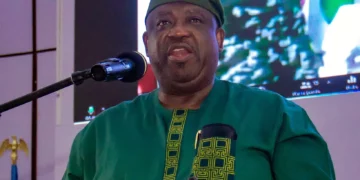Rural Electrification Agency (REA) has expressed concern over the low number of renewable energy jobs in Nigeria, revealing that only about 70,000 people are employed in the sector despite the country’s vast potential and urgent energy access needs.
To bridge the gap, REA, and the National Power Training Institute of Nigeria (NAPTIN) in partnership with the Energy Innovation and Empowerment Initiative (EIEI),, and key stakeholders, has launched the Next Generation Renewable (NextGen) Programme, an initiative to empower Nigeria’s youth and accelerate the country’s renewable energy sector.
This initiative aims to equip young Nigerians with the technical skills and leadership capabilities needed to fill the human capital deficit in the renewable energy sector.
The programme, which kicked off in Abuja on Friday, its first cohort training with 120 young Nigerians, focusing on equipping them with critical skills to lead the future of renewable energy in the country.
Selected from a pool of 10,236 applicants, the scheme will equip the 120 youths with technical and leadership skills to drive the country’s clean energy transition.
Delivering a keynote address, REA managing director Abba Aliyu highlighted that Nigeria, with one of the highest populations lacking electricity access—estimated at 75 million people—has only created around 70,000 jobs in renewable energy, a figure far below what is needed to meet the country’s energy transition goals and economic development targets.
He outlined REA’s commitment to mobilizing over $1 billion in funding— including an additional $200 million in co-financing— to expand renewable energy infrastructure. The agency plans to scale local solar panel manufacturing capacity from 110 megawatts to over 600 megawatts, collaborating with firms such as LPV, GRV, Ozo, and C-One Ed.
“If you look at the IRENA report, the renewable energy sector has created about 14.7 or 14.4 million jobs over a period of time. More than 50 per cent of those jobs were domesticated within China. India accounted for about 1 million. Brazil accounted for about 1.5. Europe also has about 1 million. The entire African continent accounted for only 320,000, of which the country with the greatest, highest number of people that do not have access only accounted for 70,000 of those jobs. We need to change that narrative.
“We are here now starting to go beyond rhetoric, going beyond just talking and walking the talk. We are about to add 120 additional job opportunities into the space by this event that we are taking place, and I think we deserve a round of applause. So we have started changing this narrative, the MD said.
He praised the programme’s unique structure, gender inclusivity, and regional equity, calling it “the first of its kind.”
He stressed the importance of building a robust talent pipeline to leverage the substantial financing secured for renewable energy projects, including a record $750 million public sector funding.
He noted that without adequately trained Nigerians to operate and maintain renewable infrastructure, the country risks losing out on the benefits of these investments.
On her part, Minister for Women Affairs, Hon. Imaan Sulaiman-Ibrahim, speaking on behalf of Hon. underscored the significance of empowering women and youth through equitable access to energy innovation.
Represented by the permanent secretary, Federal Ministry of Women Affairs, Dr. Dr Mariam Keshinro, the minister highlighted the Ministry’s flagship Women and Youth Power Project, aimed at deploying solar energy solutions across all Nigerian local government areas.
Representatives of other key ministries were present, including minister of Power, Adebayo Adelabu, represented by Owolabi Sunday; minister of Youths, Ayodele Olawande; and minister of Labour and Employment, Muhamadu Maigari Dingyadi, represented by Emmanuel Igbunuson.
Director general of the National Power Training Institute of Nigeria (NAPTIN), Ahmed Bolaji Nagode, warmly welcomed participants, emphasising the programme’s significance as a tripartite collaboration between NAPTIN, the Rural Electrification Agency (REA), and Eco-Innovation Empowerment Initiatives (EIEI). He highlighted the urgent need to address the skills gap in Nigeria’s power sector, especially in renewable energy, where human capital is currently underutilised.
Nagode stressed that the programme is designed not just to provide academic knowledge but to fill the critical void of practical, industry-relevant skills. “We need to build a vibrant, efficient, and effective workforce that will sustain and grow the renewable energy infrastructure in Nigeria,” he said, noting that the initiative aligns with President Muhammadu Buhari’s vision for local content and job creation.
Director at EIEI, Dr. Alex Tamulobian described the program as “a strategic investment in youth talent” to bridge the gap between academic knowledge and industrial relevance in Nigeria’s renewable energy sector.
She outlined the programme’s vision to cultivate the next generation of leaders in the energy sector. The NextGen Rescue Programme is structured into two phases: classroom-based technical training in partnership with NAPTIN, followed by a nine-month industry internship with leading renewable energy companies, including Prado Power and other RESCOs (Renewable Energy Service Companies).
The programme targets participants from Nigeria’s six geopolitical zones, with a deliberate 60-40 gender distribution favoring female participation to promote inclusivity in the sector. From over 10,000 applicants nationwide, only the best 130 were selected, underscoring the programme’s rigor and prestige.
Key objectives include developing technical proficiency in solar PV installation, mini-grid design, and energy efficiency, while also fostering leadership, project management, and innovation skills. Continuous evaluation, mentorship, and real-world project experience will prepare graduates for immediate employment and leadership roles in the renewable energy industry.
We’ve got the edge. Get real-time reports, breaking scoops, and exclusive angles delivered straight to your phone. Don’t settle for stale news. Join LEADERSHIP NEWS on WhatsApp for 24/7 updates →
Join Our WhatsApp Channel










